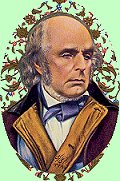 |
Edward Fitzgerald's
Edward Fitzgerald The 12th century Persian poet Omar Khayyám, is well known in the West, through the work of the English poet and translator Edward Fitzgerald. Published in 1859, Fitzgerald's "Rubáiyát of Omar Khayyám" attracted little attention until 1860, when it was discovered by other artists and literary figures, such as Dante Gabriel Rossetti who was a poet, and is well-known as one of the painters of the Pre-Raphaelite Brotherhood. Fitzgerald was a talented poet; however, his "Rubáiyát" is not a serious and scholarly translation of Khayyám's work, and represents many of his own ideas and line of thought. In the eighteenth and nineteenth centuries, writers and poets quite often used Oriental works for inspiration. The original verses from which Fitzgerald drew his inspiration, are a collection of isolated and separate "quatrains", which resemble the Japanese haiku in function, if not in form. The quatrain, "robái" is a very popular form in Persian poetry, and nearly every Persian poet has written some. This is the only form of poetry attributed to Khayyám, whose fame in his own time was through his influential works as a mathematician and astronomer. Indeed, he was only twenty-four when he wrote his most important work, a pioneering treatise on algebra. Fitzgerald's "Rubáiyát" describes what he believed to be the thoughts and feelings of Omar Khayyám, with seemingly Eastern tones and colours, but in a way that would be appealing to a Western audience. The "Rubáiyát's" tendency to rebel against the restricting Puritanism of the Victorian era, captured the imagination of many freethinkers of the time, yet it was only universally appreciated, after Fitzgerald's death. Today, Fitzgerald's Rubáiyát of Omar Khayyám has been translated into many languages world-wide, and can be regarded as a masterpiece in its own right. Most importantly, Fitzgerald helped to create in the West, a real interest in Persian literature as a whole. The following are examples from
Come, fill the Cup, and in the Fire of Spring Your Winter Garment of Repentance fling: The Bird of Time has but a little way To fly - and Lo! the Bird is on the Wing.
Look to the Rose that blows about us - Lo, Laughing she says, "into the World I blow: At once the silken Tassel of my Purse Tear, and its Treasure on the Garden throw."
With them the Seed of Wisdom did I sow, And with my own hand labour'd it to grow: And this was all the Harvest that I reap'd- "I came like Water, and like Wind I go."
How long, how long, in infinite Pursuit Of this and That endeavour and dispute? Better be merry with fruitful Grape Than sadden after none, or better, Fruit.
With Earth's first Clay They did the Last Man's Knead, And then of the Last Harvest sow'd the seed: Yea, the first Morning of Creation wrote What the Last Dawn of Reckoning shall read.
Oh, plagued no more with Human or Divine, To-morrow's tangle to itself resign, And lose your fingers in the tresses of The Cypress - slender Minister of Wine.
I sent my soul through the Invisible, Some letter of that After life to spell: And by and by my Soul return'd to me, And answer'd "I Myself am Heav'n and Hell."
Copyright shall at all times remain vested in the Author. No part of the work shall be used, reproduced, stored in a retrieval system, or transmitted in any form or by any means electronic, mechanical, photocopying, recording or otherwise, without the Author's express written consent. Copyright© 1998 K. Kianush, Art Arena |
